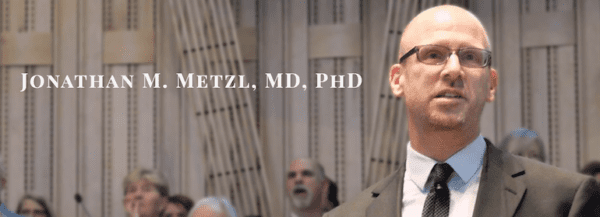Jonathan M. Metzl is the mainstream media’s go-to guy for sound bites about psycho-killers. Back in 2015, the professor of sociology and psychiatry and the Director of the Center for Medicine, Health, and Society at Vanderbilt University wrote Mental Illness, Mass Shootings, and the Politics of American Firearms. Rehashed ever since, most recently in a Politico polemic, Dr. Metzl’s paper counters the claim . . .
that “gun violence” is a mental health issue. He points out that shrinks rival dentists in their ability to predict which patients will go postal (paraphrasing).
Yes, well, in the cases his paper references — Newtown spree killer Adam Lanza and Aurora mass murderer James Holmes — both killers were clearly crazy and known to mental health professionals. In fact, Holmes’ psychiatrist was so concerned about her patient’s [freely admitted] desire for violence she had him ejected from school.
Even though Dr. Metzl’s paper promotes gun control — an area well outside his wheelhouse but popular with his peers — he makes a convincing case that the vast majority of firearms-related crimes have nothing to do with mental health issues.
Mind you, that’s crime. Not suicide, obviously, which accounts for almost two-thirds of America’s firearms-related fatalities.
In the Politico version — I’m a Psychiatrist Get Me Out of Here. Making Gun Violence About Mental Health Is a Crazy Idea. — Dr. Metzl once again wanders off the mental health reservation to call for civilian disarmament:
In the broader sense, asking us to diagnose mass shooters in isolation feels impossible without addressing the larger contexts that surround the rise in mass shootings in the United States, like the dramatic increase in civilian owned assault rifles and other weapons of mass casualty.
Many current analyses link this expansion to trends in mass shootings. As the New York Times recently put it, “the only variable that can explain the high rate of mass shootings in America is its astronomical number of guns.”
Yet this expansion of guns in everyday life has gone hand in hand with a narrowing of the rhetoric through which U.S. culture talks about the role of guns and shootings. Insanity in the aftermath of mass shootings then becomes the only politically safe place to discuss charged issues such as gun violence prevention or strategies for public safety.
Sure. People are only focusing on the fact that Sutherland Springs spree killer Devin Kelley escaped from a mental institution as a way to deflect from a wider discussion about how to remove “weapons of mass casualty” from civilized society. A category that doesn’t include pressure cookers, apparently.
Psychiatrists are eager to help reduce gun violence. But when politicians ask us to predict the impossible, or reduce complex social phenomena into “mental health” issues, it’s often just an excuse for their own failure to address the problem.
Because the mental health professionals who “treated” Mssrs. Lanza, Holmes and Kelley (amongst other mass murderers) bear no responsibility for failing to intervene to stop the slaughter their patients inflicted on innocent life. Well, that’s one theory . . .
